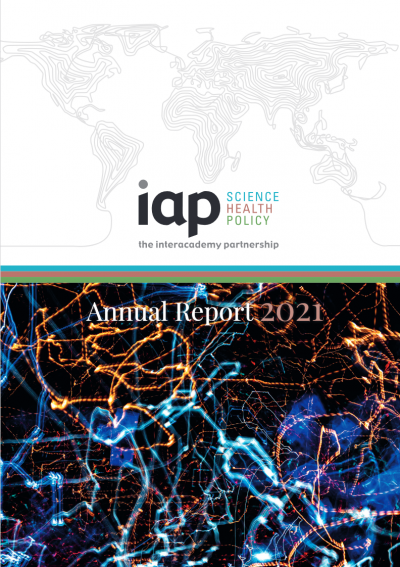


The new IAP Annual Report provides an overview of activities of the InterAcademy Partnership (IAP) in 2021, with specific sections on activities by affiliated regional networks AASSA, EASAC, IANAS, and NASAC. The Report also gives evidence of IAP’s focus on providing science advice and promoting cooperation and capacity building among its membership - the world’s merit-based academies of science, medicine and engineering.
You can download the full 2021 IAP Annual Report here.
Recent years have seen much change in the way the world works. The COVID-19 pandemic marked a turning point not only for the scientific community, but for everyone. As a scientific organization, the InterAcademy Partnership (IAP) can be proud that science has made a huge contribution to dealing with the pandemic – from prevention to diagnosis to treatment – and COVID-19 vaccines are now playing a pivotal role in the global fight against the virus.
In 2021, the COVID-19 crisis has been central to the work of the IAP. We not only stepped up to urge world leaders to reduce the impact of the pandemic on higher education and to strengthen COVID-19 research. We also organised a highly successful event to highlight how academies – as trusted and credible voices – can counter vaccine hesitancy, tackle false and misleading claims about the safety and efficacy of vaccines, and promote a culture of trust in vaccines (see page 13).
But our efforts to promote health did not stop there. We supported the Sustainable Health Equity Movement (SHEM) to promote health equity as an ethical principle that guides all national and international economic, social and environmental policies. Furthermore, we fostered the IAP Young Physician Leaders (YPL) alumni network, a group of exceptional young medical professionals from around the world who work to improve health in their countries and globally (see page 17).
Unfortunately, during the pandemic, we have also witnessed a growing wave of anti-scientific beliefs. This highlights once again the importance for everyone, and especially for children, to develop rational thinking and scientific understanding of complex problems. This is why, among other activities, the IAP Science Education Programme (SEP) worked with its partners to develop a community response guide for youth on vaccines and supported the roll-out of a guide on COVID-19 in African countries (see page 21).
It is now clear that the scientific enterprise is crucial for human well-being. Yet it is menaced by predatory journals, publishers and conferences. In 2021, our project on Combatting Predatory Academic Journals and Conferences explored these practices in more depth than any study previously, and we are sure it will help guide the scientific community to tackle these pervasive and damaging practices (see page 24).
Meanwhile, conflicts, violence, human rights violations and climate change continue to displace undisclosed numbers of people. Among them are scientists, medical professionals, engineers and others with technical training. 2021 saw the launch by UNESCO-TWAS, the International Science Council (ISC) and IAP of ‘Science in Exile’, an initiative which aims to create a network of like-minded organizations that work together to develop a global platform and roll out a coordinated advocacy campaign, in order to foster a cohesive response for the support and integration of refugee, displaced and at-risk scientists (see page 28).
Advances in science are key to solving today’s most challenging problems and to achieving the Sustainable Development Goals (SDGs). But at a time when research capacity in the biosciences is increasing, and new technologies such as genome editing and synthetic biology are becoming accessible in more and more countries, we must promote a culture of responsibility and guard against any misuse. In 2021, our Biosecurity Working Group worked with colleagues at Tianjin University and Johns Hopkins Center for Health Security to produce the ‘Tianjin Biosecurity Guidelines for Codes of Conduct for Scientists’, a set of much-needed measures for managing bio-risks that we hope will be soon integrated into national and institutional biosecurity and biosafety codes of conduct (see page 32).
In 2021, IAP also supported 77 meetings and 35 publications. IAP outputs and activities would not have the global relevance they have without our regional networks in Africa (NASAC), Asia (AASSA), the Americas (IANAS) and Europe (EASAC). We would like to thank them once more for the outstanding work they carried on in these difficult times, including on the ongoing ‘Climate Change and Health’ project, and for making sure the voice of science is heard by policy-makers in their part of the world and globally (see pages 36-48).
Lastly, we thank former IAP Co-president Volker ter Meulen, who at the request of the IAP Steering Committee has been appointed as IAP Special Advisor. We are pleased that he will continue to contribute to IAP’s mission of convening and empowering the world’s academies of science, engineering and medicine to work collaboratively to address issues of global, regional, and national importance.
To protect this planet we call home, the need for concerted advice and input from the global academy community has never been higher. Looking back at 2021, we are proud to say IAP played its part by informing the public and policy-makers not only about challenges, but also evidence-based solutions for a better world.
Depei Liu and Richard Catlow.
